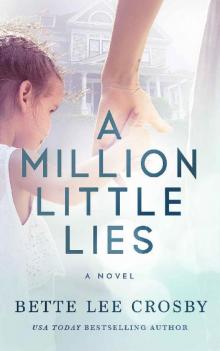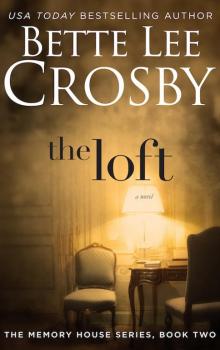- Home
- Bette Lee Crosby
Passing Through Perfect Page 2
Passing Through Perfect Read online
Page 2
“Daddy,” he said nostalgically, “remember when…”
When Otis began to breathe more evenly and his face took on its natural color, Benjamin went back to hauling buckets of water. By nightfall he had watered down the back cornfield and most of the front lot.
That night he did not go to bed but remained on the porch with his daddy. It was the first time they spoke of Lila.
“Your mama was sick for a long time,” Otis said, “but she didn’t want to tell you.”
“Why?”
“She said with you off fighting for your country, you didn’t need more worries troubling you.”
“I wasn’t doing no fighting, Daddy. I was fixing trucks and hauling stuff from one place to another. I told Mama that in my letters.”
“I know. She read every one of those letters to me a dozen or more times.”
“Then why’d she—”
Otis laughed. “Your mama was your mama. Wouldn’t matter none if you was shelling peas, to her it was good as being a general.”
For a few moments Otis sat there twisting a scrap of cord he’d picked up in the field; then he turned to Benjamin with a sad smile. “Every Sunday when Reverend Beech asked for prayer requests, your mama stood up and said, ‘Please pray for our son, Benjamin, he’s a soldier in the United States Army.’ Being proud of you gave your mama a whole lot of happiness. Even when she was bad sick, she kept asking the Lord to take care of you.”
A look of regret clouded Otis’ eyes when he added, “I reckon she should’ve been praying for herself.”
Rain
The drought lasted until the first week of August. Then when half of the cornfields in Alabama were burnt to a crisp and the farmers had given up on praying for rain, it came with a vengeance.
The morning dawned with a grey haze hanging over the cornfields and the air heavy with the smell of heat. Benjamin rose from the damp sheet and pulled on a pair of cut-off trousers. “Daddy,” he called out to the porch, “any sign of rain out there?”
Otis looked across the dry cracked ground. “Same as yesterday.”
Benjamin poured himself a cup of day-old coffee and sliced up a green apple. It was too hot for coffee, too hot for food. Simply breathing was a day’s work in itself, and he had yet to carry water to the far field.
Gulping down a few sips of the coffee and leaving most of the apple to turn brown, he walked outside and groaned. “Lord God, ain’t this heat ever gonna break?”
“Sooner or later it will,” Otis answered. “Sooner or later.” He sat there, expressionless as the land.
“I’m hoping it’s sooner,” Benjamin said and started toward the well.
When the first clap of thunder came, Benjamin was in the far field. He’d already made three trips back to the well and dampened the ground with six buckets of water. He set the buckets on the ground and looked up at the sky. It was the dusky grey of early evening. No storm clouds in sight, just a dark, heavy-looking sky.
He raised a fist in the air and screamed, “Rain, dammit, rain!”
A second boom sounded and the sky grew black as night. Benjamin started back toward the house, but before he’d gone halfway a flash of lightning cut across the sky and hit a longleaf pine. The tree, five times taller than Benjamin himself and years older, split in two and crashed to the ground.
That’s when he took off running. By the time he reached the house he was soaked through to his underwear and wearing a smile that stretched across the full width of his face.
The dry spell ended with that storm. Throughout the remainder of August and well into October, the rain came most every afternoon; not a deluge, but soft gentle showers that left the field ankle-deep in thick black mud. Once the earth molded itself around the root of the plants, the corn that had days earlier been near stunted grew like weeds. Benjamin walked barefoot through the field checking and then rechecking the plants, the mud squishing between his toes and rising up to cover his feet. He’d come back to the house dragging clumps of mud with every step, but his smile was one he hadn’t smiled since the day he returned to Grinder’s Corner.
In less than two weeks the corn was ready for picking. Working together Otis and Benjamin harvested the crop, hauled it to market, then cut down the stalks. Otis seemed less weary, the evening breeze cooler, and Benjamin’s heart a bit lighter. It was as if the rain had washed away the weariness of summer and brought new life.
The summer corn brought a better than average price, and before they left town Benjamin bought a bushel of sweet potato slips along with the seed and fertilizer he’d need for a field of beets. In the early weeks of September he readied the ground for a second planting, first turning the soil, then leaving it to dry. Once the ground was harrowed, he began to plow, working from first light until he could no longer see his hand before his face. When Henry grew too weary to pull the plow, Benjamin unleashed the mule and pushed the single-blade plow by hand. Before the end of the month he had a field of sweet potatoes planted and the ground ready for a field of beets and a half field of broccoli.
With the ground soft and moist the second plowing was easier and Otis, who was looking a lot less peaked, found the energy to help. He didn’t spend long hours pushing the plow as Benjamin did but he’d walk behind, fixing the furrows so they were ready for seed.
The weather stayed warm, and when Benjamin saw sprouts of green coming up the second week of October he began to talk about the possibility of having enough money for a used tractor.
“If we could find one what’s broke,” he said, “I could get it going.”
“That you could,” Otis said with a grin. “That you could.”
The days were long and the work endless, but the week before Thanksgiving they brought in a second harvest. They filled the wagon with beets and sweet potatoes and hauled it over to Twin Pines, a town that was only half as far as Bakerstown and a place where the color of a man’s skin wasn’t part of the bargaining. With a good number of summer crops lost to the earlier drought, the price of produce was higher than ever. When Tom Coolidge said he was willing to pay $1.80 a bushel for sweet potatoes, Benjamin could almost see himself riding around on a tractor.
Their next stop was the Supply Depot.
“I’m maybe interested in a tractor,” Benjamin said.
Clyde Boone, owner of the shop and a man who was somewhat uppity for a colored, looked at him with a raised eyebrow.
“Them tractors is a thousand dollars; you ain’t got that kind of money.” The curl in his lip indicated it wasn’t a question.
“I was thinking used,” Benjamin replied.
“Used is five, maybe six hundred. You got that?”
Benjamin shook his head. “You got one what’s broke? Something you’re maybe looking to get rid of for a hundred?”
“I got one for a hundred-eighty. It’s running but ain’t working good.”
Benjamin didn’t have one hundred and eighty dollars. He had one hundred and thirty-two, and the only reason he had that much was because he’d pocketed most of his mustering out pay and hadn’t spent a dime other than buying seed and a few parts for the old car.
“I ain’t seeing my way clear for spending that much,” Benjamin said. “Can you maybe do better?”
Clyde frowned. “With a little fixing up it’s worth four easy. One-eighty’s a steal.”
“Well, I ain’t got one-eighty, so I ain’t ready to steal it.” He turned and started toward the door.
“You planting winter crops?” Clyde called out.
Benjamin shrugged. “Maybe.”
It was a known fact that Clyde Boone showed no favor to his own, but neither was he willing to let a loose dollar walk out the door.
“It’d be a lot easier if you had that tractor,” he said.
“True enough,” Benjamin answered, “but I still ain’t got one-eighty.”
“How much you got?”
Knowing Clyde would take the pennies off a dead man’s eyes, Benjamin hesitated. “Hu
ndred and ten,” he finally answered.
“Well, then,” Clyde said with a smile, “I reckon we can maybe work something out.” He suggested Benjamin give him the hundred and ten now, another forty when he sold the winter crop in early March, and yet another forty when he sold the spring harvest.
Benjamin ran through the numbers in his head. “That’s ten dollars more’n you’re asking.”
“It’s a finance charge,” Clyde said.
“I ain’t buying no fine-nance,” Benjamin replied.
They went back and forth for several minutes, then finally agreed Benjamin would pay thirty-five dollars in March and the same amount when the spring harvest was sold.
When they left Twin Pines, Otis was riding in the wagon and Benjamin was following behind in a tractor that was huffing and puffing like a dying man.
On days when the sun was warm and the sky clear, Benjamin would work in the field tending the late crops and readying the other field for an early spring planting. When the wind blew and the temperature dropped to where early morning frost clouded the window, he’d slip on an extra sweater and head for the barn. That’s when he’d work on fixing various parts of the tractor. He’d clean them, adjust the belts, and then put it back together again. At the end of the day his palms would be covered with the grease of the engine and his knuckles raw with scrapes, but he’d come in smiling.
The tractor held out long enough for Benjamin to till the front lot and most of the back. When it stopped running altogether, he hitched Henry to the plow and finished turning the back lot. By early December they had planted long rows of parsnips, winter squash, and green onions.
After the seeds were in the ground, Benjamin began rebuilding the tractor from the ground up.
“Come spring,” he said, “this thing is gonna be purring like a kitten.”
Not as Expected
A week before the final harvest Otis ran short of tobacco and drove into Twin Pines. He used the car Benjamin had repaired and simonized until it shined like a new penny. The minute he stepped out of the car he found himself nose to nose with Denny Walters who’d crossed over from the other side of the street.
“Well, Lordy me,” Denny said, laughing. “Look at you, living high on the hog!” He eyed the car and grinned. “Where’d you get a nice car like this?”
“Belongs to my boy, Benjamin,” Otis answered. Skinny as he was you could easily see how his chest puffed out with pride. “He’s home from the army.”
“Already? Seems it ain’t been that long.”
“More’n four years,” Otis answered.
They stood and talked for a while, mostly about crops, weather, and Denny’s daughter, Lucille.
“High time she got married,” he said. After that he went into the specifics of what a wonderful wife Lucille would make.
“She can whip up cornbread like you ain’t never tasted. Ben ought to grab her up ’fore somebody else does,” he said.
Otis laughed. “Benjamin’s too busy to be thinking of women. Only thing on his mind is farming and making money.”
“That ain’t good.” Denny shook his head ruefully. “Men got natural instincts, and when they ain’t got a woman…” He left the rest of that thought unsaid.
A picture of Lila came to mind, and Otis remembered how it was. When she was alive there were hot biscuits and savory stews. On days when the weight of work bent his back, she’d rub his shoulders and ease the pain. And in the dark of night when they were side by side in the bed, she’d press her body close to his and it brought a feeling of completeness. Were it not for Lila, he wouldn’t have Benjamin; were it not for Benjamin, Otis would surely have one foot in the grave.
“It’s the God’s honest truth,” he said, sighing. “A man ought to have a woman.”
Denny’s eyes lit up. “Maybe if Ben was to meet up with Lucille…”
Otis laughed. “Benjamin ain’t one to have me meddling in his business.”
“I ain’t saying we got to meddle, but they got a festival at Brotherhood Hall this Saturday, and if you was to bring Ben and I was to bring Lucille…”
Otis nodded. “Saturday, huh?”
That very evening Otis told his son they’d been working way too hard and needed to do a bit of socializing.
“Now we got everything in the ground, there ain’t nothing to do but wait for it to grow,” he said.
Although Benjamin had planned to spend Saturday replacing a worn belt on the tractor, he agreed to go to the festival.
“I’m thinking you ought to wear your uniform,” Otis said. He claimed it was a prideful thing he wanted to show his friends, but the truth was he had Lucille in mind.
The Brotherhood Hall was a wooden building smack in the center of town; across the street was a dirt lot for parking. By the time Benjamin and Otis arrived, the music and laughter could be heard for ten blocks in any direction. When they walked through the door Denny was waiting. He grabbed hold of Lucille’s hand and pulled her closer.
“Ben,” he said, “you met my daughter, Lucille?”
“Afraid not. Pleased,” he said and gave a nod.
Lucille was plain as oatmeal and shy as a scared turtle. She gave him one quick glance, then ducked back into her shell.
With the music from the jukebox loud and bouncing off of the walls, there wasn’t much room for talking.
“Ask Lucille to dance,” Otis prodded.
Benjamin did.
As they stepped onto the floor, the Les Brown record ended and the music went from Sentimental Journey to Be-Baba-Leba. Poor Lucille looked like she was on the verge of fainting.
“I can’t jitterbug,” she whispered in Benjamin’s ear.
“I ain’t none too crazy about it myself,” he answered. “We’ll get us some lemonade and wait for something else.”
As they walked off the floor Benjamin got his first glimpse of Delia. She was wearing a red dress, tight around her waist with a skirt that flew up to the middle of her thigh as she jumped around. It was a quick flash of smile with lips scarlet as a ripe cherry, but already Benjamin knew he wanted more.
He guided Lucille over to the refreshment table and ordered two lemonades. As they stood there sipping their drinks he scanned the dance floor in search of the red dress, but by then she was gone.
In time Be-Baba-Leba gave way to a soft tempo foxtrot, and they returned to the dance floor. Halfway through the dance Benjamin looked over Lucille’s shoulder and saw those red lips smiling; not just smiling but smiling at him. In what was less than a heartbeat, she was gone again.
“There I’ve said it again,” Vaughn Monroe crooned from the jukebox, but Benjamin heard nothing. He stumbled through the remainder of the song, then returned Lucille to her father’s side.
“Thank you for the dance, Miss Lucille,” he said politely; then off he went in search of the red lips.
Delia stood in the far back and saw Benjamin crossing the floor. When he drew closer she said, “Hi, soldier,” and gave a smile.
Benjamin was comfortable talking to most anybody, but when he tried to answer Delia, his tongue got tied in knots. “I ain’t exactly…I used to…but…I ain’t…”
Delia laughed. “Is this your way of not asking me to dance?”
“No, ma’am,” Benjamin stuttered.
“Ma’am?” Delia smiled. “You talking to me or my mama?”
“Why, you, of course…”
“Well, then, call me Delia,” she said. “Ma’am sounds like my mama.”
As if it were something predestined from the first tick of time, Delia slipped into Benjamin’s arms and they moved onto the dance floor. They danced every dance, and before the evening was over she’d agreed to see him again on Tuesday evening.
“We can meet down by the movie,” she said. “Six o’clock.”
By then Benjamin was in love with Delia and would have agreed to meet her on the moon if that was what she wanted. The promise of seeing her again was enough; he’d asked for nothing more.
On the drive home he told his daddy, “I’m in love.”
“Well, I’ll be.” Otis grinned. “You fooled me good. I could’ve swore you didn’t care a fig for Lucille.”
“Not Lucille,” Benjamin said. “Delia.”
“Delia who?”
Benjamin laughed. “Darned if I know. I got so twisted into knots I done forgot to ask her last name.”
“Where’s she from?”
“I didn’t ask that neither.”
Otis chuckled. “Love’s more ’n climbing into bed together. Love don’t come ’til folks get to liking each other. All you got now is an itch needing to be scratched.”
Benjamin knew better, but he also knew when his daddy got a thought in his mind there wasn’t any way of arguing it out. Otis hadn’t seen the warmth in Delia’s eyes; he hadn’t heard the ripple of her laugh. Benjamin had. The sweetness of that sound still echoed in his ears, and when he remembered her eyes he could see they were flecked with gold like his mama’s.
As they drove the rest of the way in silence, Benjamin thought back on Lila’s laughter and when he finally caught hold of a memory and brought it to mind, it had the same lighthearted sound as Delia’s laugh.
On Tuesday evening Benjamin was parked in front of the movie theater by five-thirty. He climbed out of the car and stood directly in front of the ticket booth, looking up and down both sides of the street. The minutes ticked by slowly as he waited, and he came to realize how foolish he’d been in not learning Delia’s last name. If there was some unforeseen circumstance—a sprained ankle, a flat tire, or an unexpected delay of any sort—it could prevent her from coming and they’d lose track of one another. If that happened he might never find her again. The thought of such a thing sent a shiver of dread down his spine, and he vowed that before the night was over he’d know everything there was to know about her.

 Emily, Gone
Emily, Gone A Million Little Lies
A Million Little Lies Previously Loved Treasures
Previously Loved Treasures The Loft
The Loft Spare Change
Spare Change Memory House: Memory House Collection (Memory House Series Book 1)
Memory House: Memory House Collection (Memory House Series Book 1) Silver Threads
Silver Threads Wishing for Wonderful: The Serendipity Series, Book 3
Wishing for Wonderful: The Serendipity Series, Book 3 The Summer of New Beginnings: A Magnolia Grove Novel
The Summer of New Beginnings: A Magnolia Grove Novel The Regrets of Cyrus Dodd
The Regrets of Cyrus Dodd Passing Through Perfect
Passing Through Perfect Baby Girl
Baby Girl Jubilee's Journey
Jubilee's Journey Beyond the Carousel
Beyond the Carousel What the Heart Remembers
What the Heart Remembers Cupid's Christmas
Cupid's Christmas Cracks in the Sidewalk
Cracks in the Sidewalk Blueberry Hill
Blueberry Hill The Twelfth Child
The Twelfth Child A Year of Extraordinary Moments (A Magnolia Grove Novel)
A Year of Extraordinary Moments (A Magnolia Grove Novel)